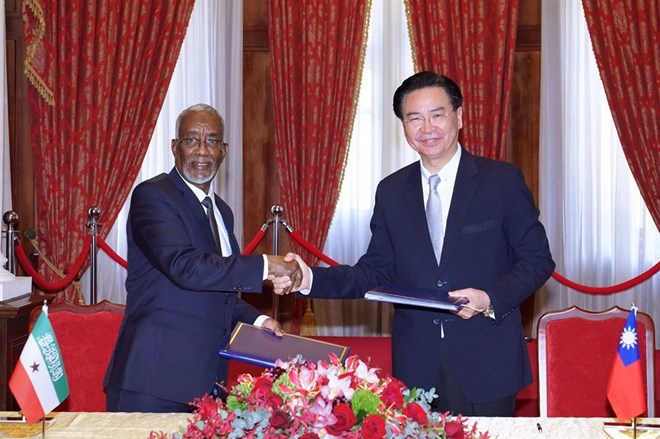
Monday August 3, 2020

Foreign Minister Joseph Wu (right) and his counterpart from Somaliland, Yasin Hagi Mohamoud shake hands after they signed an agreement for setting up representative offices in the two countries in Taipei in February. / File photo courtesy of the Ministry of Foreign Affairs
Taipei, Aug. 3 (CNA) The Ministry of Foreign Affairs (MOFA) on Monday declined to comment on a report by the Somaliland Chronicle that the self-declared East African state is preparing to recognize Taiwan.
"The MOFA will not comment on Somaliland media reports that quote unnamed sources," MOFA spokeswoman Joanne Ou (歐江安) said in a statement.
Ou said, however, that MOFA and Somaliland's government agencies, including its foreign ministry, continue to discuss exchanges of representative offices and future cooperation plans based on mutual benefit and reciprocity.
She was responding to a report in the Somaliland Chronicle that said Somaliland President Muse Bihi Abdi has instructed "close confidants" to explore the possibility of mutual recognition between Taiwan and Somaliland.
The news report, which quoted sources who spoke on condition of anonymity, also said Abdi is weighing the "pros and cons of unilateral recognition of Taiwan."
On July 1, Taiwan Foreign Minister Joseph Wu (吳釗燮) announced at a press conference in Taipei that Taiwan and Somaliland signed an agreement in February to set up representative offices in each other's territory.
Both sides have already named officials to head those offices, although the date of their official opening has not yet been announced.
The moves have been condemned by the governments of China and Somalia, as Beijing considers Taiwan as part of its territory and Mogadishu sees Somaliland in the same way.
Though not recognized as a country by the international community, Somaliland has more than 20 representative offices in various countries while several nations and international organizations, including the United Nations, maintain offices in Hargeisa.
Taiwan has 15 diplomatic allies and maintains economic and cultural offices in more than 50 countries around the world.